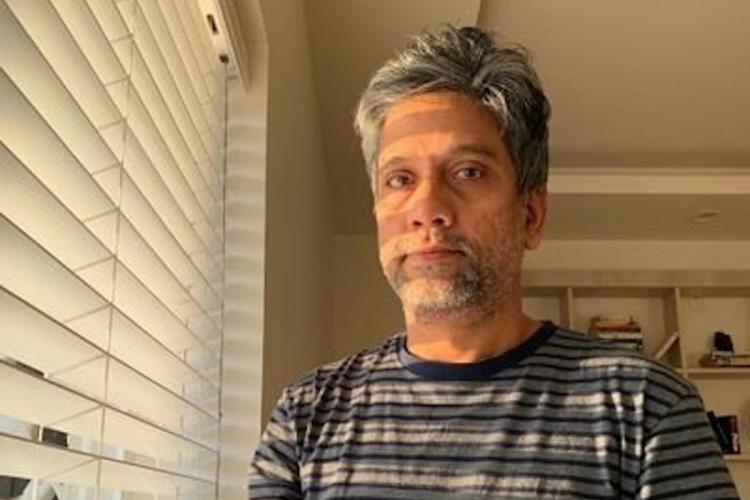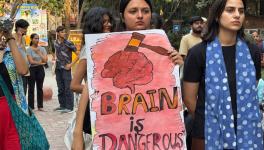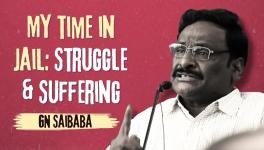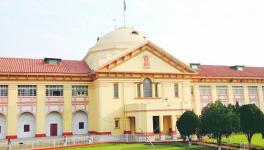Hany Babu: Portrait of a Professor as an Activist

Delhi University Professor Hany Babu. Image Courtesy: The News Minute
Arts faculty, North Campus, Delhi University: a winter afternoon in 2014 – at least two hundred students in a room that could perhaps accommodate a hundred. The chairs are rickety; some sit by the windows, some on the floor, some by the doors and some on the platform from where Hany Babu is talking about universal grammar. He has just finished a diagram with the noun phrase and the auxiliary verb and has, perhaps, turned to ask us what the verb phrase would be.
He looks to his left and notices those sitting by the windows. “Those who’re sitting by the window on that end of the room, please be careful. Please don’t fall,” he said. He looks to his left and says: “I am not too worried about you.” All of us laughed. But Hany didn’t. He smiled. He always smiled. The classroom was on the first floor. The wall with windows on the left led to a corridor; the wall with windows on the right led to a wonderful afternoon breeze and the garden down below.
The English department of Delhi University – which offered Masters classes – had a compulsory course on linguistics, and frazzled students who didn’t have to compulsorily turn up for classes had to attend it in order to correctly pick out noun phrases from verb phrases. Shortly after class, just outside the Arts Faculty gate, they would also often catch a glimpse of a hunger strike. It wasn’t a surprise to see Hany there.
In the previous semester, I saw G.N. Saibaba waiting outside the classroom at South Campus, Delhi University. He taught at Ram Lal Anand College and took guest lectures for an optional paper on Indian literature for the Masters’ students (These guest lectures were often without pay or with minimal pay. The university – at the postgraduate level – had successfully managed to proceed with wageless labour.) By the time I finished my second semester and had qualified to take the Indian literature course G.N. Saibaba taught, he was arrested.
Linguistics was a compulsory paper in the third semester and Hany Babu, I soon learnt, was actively working with the Committee for the Release and Defense of GN Saibaba. In the next few years G.N. Saibaba would be convicted. The drawbacks in the reasoning of the judgement would be released by the Committee in a booklet at a press conference in April 2017 at the Press Club, Delhi. I had begun working in the media by then and was producing that news feature.
Hany, once again, was busy running around, perhaps making sure that there was enough tea for everyone. By now, it was not unusual for me to see Hany in various roles, and the unassuming manner in which he carried himself in those roles. (Rumour had it that in the evening he was a student and was taking law classes at the Law Faculty adjacent to the Arts Faculty at Delhi University. The rumour was true.)
If I had written this piece when I was a Masters student I would have probably brought up the fact that, in 2012, the English department of Delhi University, along with the same department at Jawaharlal Nehru University, was among the top 100 English departments across the world. Government interference in public education slowly eroded the English department at DU. Each semester, one faculty member left.
The list includes Rochelle Pinto and Baidik Bhattacharya (who left for Centre for the Study of Developing Societies); Udaya Kumar and Brinda Bose (who left for Jawaharlal Nehru University); Nandini Chandra (who left for the University of Hawai’i’ at Manoa); and Sambuddha Sen (who left for Shiv Nadar University). The erosion of educational institutions has garnered JNU a lot of attention; the English department in DU was already dying a slow death before the attack on JNU began.
Hany, however, would warn against a lament for the death of a “great institution”, even though he would stand against the harassment the faculty or students felt – and still feel – from the university administration. What are the terms of our protest, he would ask. ‘Is the ground for protest an erosion of greatness or legacy; in order words, of merit?’ He asked this when students protested in 2014 against appointments as well as promotions in the English department, which were being favoured for those who had been loyal to the university administration. (The Times of India woefully reported these protests.)
Like several progressive movements, however, ours was led by upper-caste students. Hany noted his reservations in a Facebook note. I remember our confusion, our internal debates to find a response to his, as well as the Ambedkar Reading Group’s critiques of our movement. We argued among ourselves, against others, as if the imagination of our freedoms were at stake. We were, in other words, discovering ourselves and others as political beings; learning to see how we can, without our knowledge, invisibilise others.
Hany, in his disagreement, initiated that process. Under pressure from the students, however, the then Head of the department agreed to form a Student-Faculty body in 2015. Hany drafted the rules for the election and put in the quiet work of formulating an inclusive policy. It ensured representation from all sections of the student community. (Elections to the Student-Faculty committee have not been held since 2015.)
Hany believed in the law, and the need for inclusive institutional policies. I realised how central this was to his thinking when we took his course on language policy debates in India when I was pursuing my M. Phil. from the same department. Hany’s relationship to the classroom, his pedagogic practice, was heavily influenced by Ambedkarite thought. He believed in the transformative potential of the Constitution and asked us to read not just the Constitution, but also it’s prehistory. In one of our early seminars, we read and discussed the language policy debates when the Drafting Committee of the Constitution was meeting to formulate our nation’s language policy. How can we arrive at a radical document that speaks for equality for all, and how are some of those possibilities thwarted by various groups within the Drafting Committee? As I write this, I realise that we must not only lament the betrayal of the promises of the Constitution. Hany would have perhaps liked us to see it as a document in process, a document that has a history, and which must be reclaimed by the citizens it speaks of.
From Hany I also learnt how a teacher, in disagreement with their students, should carry themselves. He was in a more powerful position than his students when the 2014 protest began, but didn’t impose his knowledge or his politics. He wanted us to understand that caste exists in invisible ways, and that it remains invisible, or becomes an oppressive system to be discovered, only for those who are not oppressed by it. Raising the question of merit erases the already existing structural inequalities with a “great” institution. Indeed, these inequalities persisted even when the English department made it to impressive university rankings. Decades after the Mandal commission’s recommendations, the English department, along with other departments in Delhi University, failed to implement OBC reservations. (Hany was instrumental in bringing the issue of OBC reservation in Delhi University to light.) Beside this, two members of the faculty were also named in the list of alleged sexual predators in Indian academia in 2017. Needless to say, in spite of its place in the rankings, the English department at DU did not quite offer a safe learning environment.
As is so often the practice in academia, where faculty members like to build a coterie for intellectual companionship (and favours), we knew we needn’t be his acolyte to seek Hany’s help. He didn’t have acolytes. This is why, after all these years, I could ask him to peer-review an essay for a journal issue. The NIA summons came at about the same time I was supposed to hear back from him. I emailed after a few days, apologising for a reminder email when he had been summoned by the NIA during a pandemic. “Thank you for your understanding,” he replied. He informed me he would meet them shortly. “Will see where they take it after that,” he said. Well, we can see where the NIA has taken it.
As I write this, however, I want to see Hany again in a classroom. In this moment of clamour, I want to remember his quiet, unassuming smile, the quiet Delhi winter afternoon in 2014. But that will come only after we have fought our political battles.
The writer formerly worked at the Indian Writers’ Forum and Ashoka University. He completed his M. Phil. from the Department of English, University of Delhi, in 2015. He tweets @souradeeproy19.
Get the latest reports & analysis with people's perspective on Protests, movements & deep analytical videos, discussions of the current affairs in your Telegram app. Subscribe to NewsClick's Telegram channel & get Real-Time updates on stories, as they get published on our website.
























